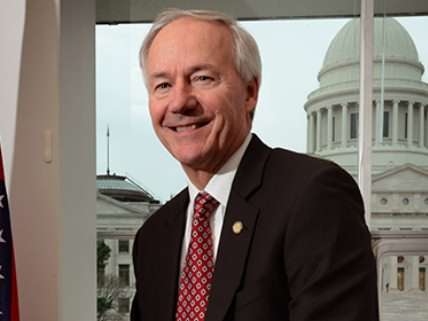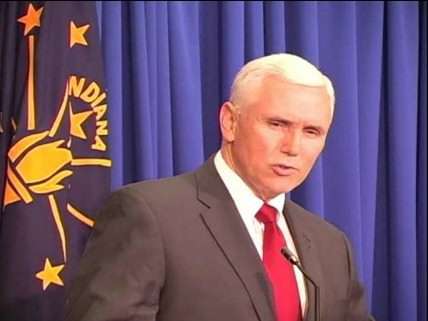Arkansas Governor Wants Religious Freedom Bill Closer to Federal Law
Why shouldn't RFRAs apply to private lawsuits?

Yesterday, as Indiana Gov. Mike Pence promised to amend his state's newly minted Religious Freedom Restoration Act (RFRA) to clarify that the law "does not give anyone a license to deny services to gay and lesbian couples," the Arkansas legislature approved a similar bill. Although Gov. Asa Hutchinson said he would sign the bill if it "reaches my desk in similar form as to what has been passed in 20 other states," today he said it was not similar enough to the federal version of RFRA and sent it back to the legislature for changes. "We wanted to have it crafted similar to what is at the federal level," Hutchinson said. "To do that, though, changes need to be made. The bill that is on my desk at the present time does not precisely mirror the federal law."
Perhaps the most consequential way in which the Arkansas bill differs from the federal RFRA is that it explicitly applies to proceedings in which the government is not a party, which would include discrimination complaints. The RFRAs adopted by Indiana and Texas, which Hutchinson before today seemed to consider essentially the same as those in the 18 other states with RFRAs, have the same provision. Should it be a deal breaker?
John DiPippa, a University of Arkansas at Little Rock law professor who testified in favor of a narrower Arkansas bill, seems to thinks so. DiPippa told The New York Times he "certainly never anticipated it applying to actions outside of government." But if two men or two women try to compel a recalcitrant photographer to take pictures at their wedding (or try to punish him for refusing to do so) by filing a complaint under a local or state anti-discrimination law, is that really an "action outside of government"? The complaint is possible only because the government has decreed that businesses may not consider sexual orientation in deciding which customers they will serve, and the penalties for violating that rule are enforceable only through the government's courts. Surely this is a kind of government action, albeit one initiated by a private party.
That logic helps explain why most of the circuit courts to consider the issue have ruled that the federal RFRA, which does not explicitly cover proceedings brought by private parties, nevertheless can be applied to them—a position that also has been endorsed by the Justice Department. As Josh Blackman, a constitutional law professor at the South Texas College of Law, points out in a recent National Review article, lawsuits in which courts have allowed RFRA defenses include copyright and bankruptcy cases as well as discrimination complaints under Title VII and the Americans With Disabilities Act. Blackman notes that "the state courts, like the federal courts, have wrestled over whether state RFRAs can be raised as a defense in private suits."
Raising the defense and winning are two different things, of course. As I noted yesterday, University of Virginia law professor Douglas Laycock, an expert on religious liberty who supports gay marriage but is sympathetic to the claims of conscientious objectors who do not want to facilitate it, is "not optimistic" that Indiana's law will shield photographers, florists, bakers, and other business owners who decline work for gay weddings in the three Indiana cities—Indianapolis, Bloomington, and South Bend—that ban discrimination based on sexual orientation. Courts may very well decide that the burden imposed on people with religious objections to gay weddings is justified by the "compelling governmental interest" in preventing discrimination. Laycock notes that "nobody has ever won a religious exemption from a discrimination law under a RFRA standard."

The uncertainty about whether a RFRA defense can work in such cases gives cover to Pence, who says he wants to sign legislation this week that makes it clear "this law does not give businesses the right to deny services to anyone." Strictly speaking, RFRA guarantees no such right; it merely provides a possible defense in certain discrimination cases. Furthermore, Indiana law does not ban discrimination based on sexual orientation, so in most of the state business owners already have "a license to deny services to gay and lesbian couples." Since Pence has said he does not want to ban discrimination based on sexual orientation at the state level, the most the "fix" he has in mind could accomplish is to let gay couples in Indianapolis, Bloomington, and South Bend conscript unwilling contractors into helping with their weddings. That sort of forced tolerance does not strike me as a noble cause, and allowing it will surely alienate the conservatives who supported Indiana's RFRA.


Show Comments (45)